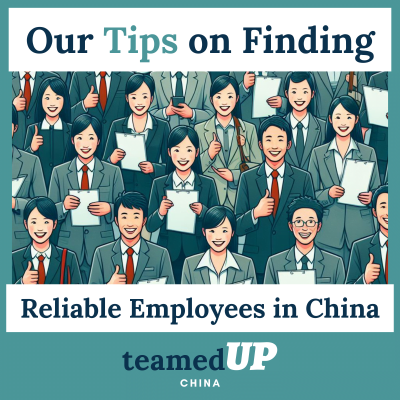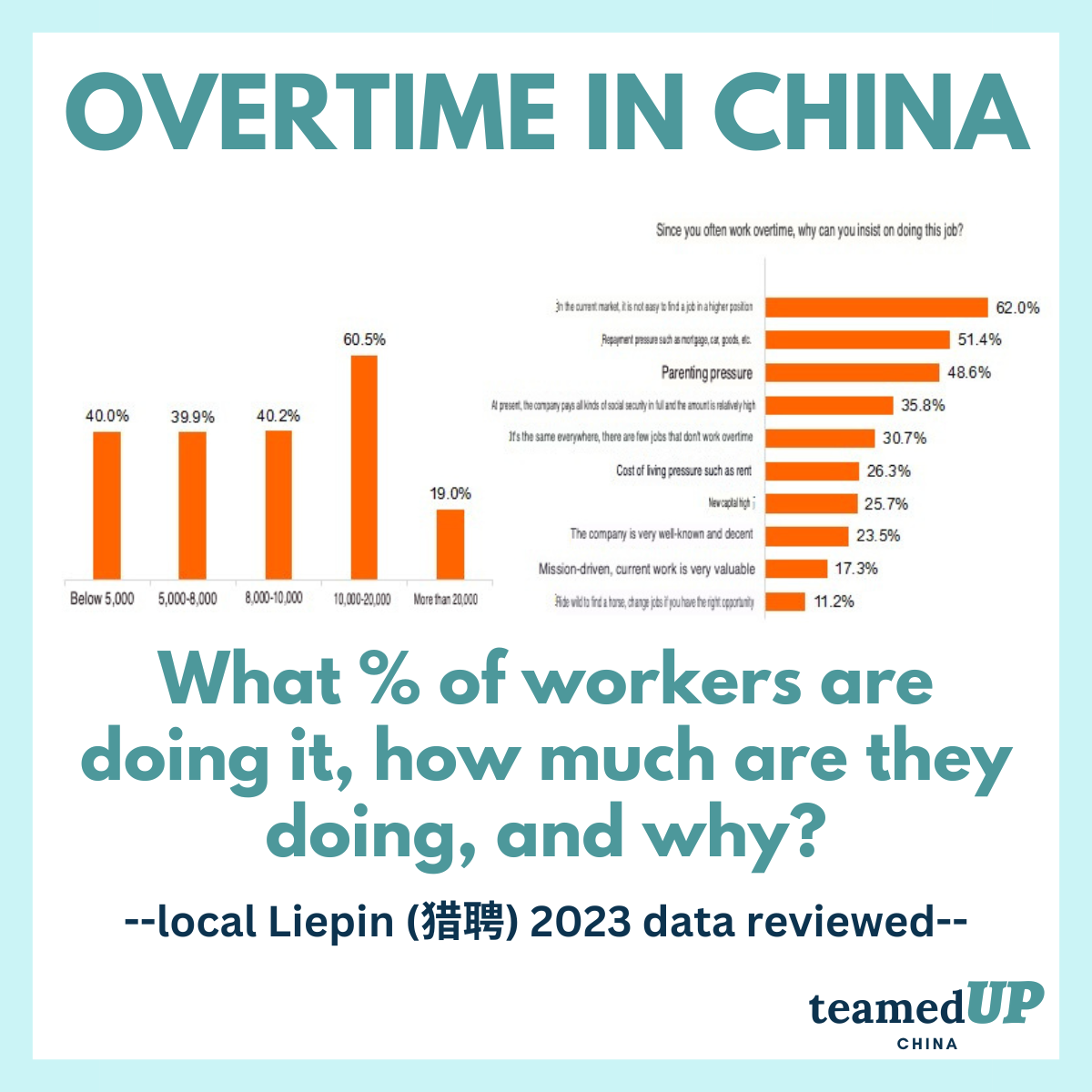Today we’re looking at ways to help with and organize hiring reliable, trustworthy employees in China! Sure, a lot of candidates look great on paper – so our main goal here is to find out if they can, in actuality, perform reliably and make a positive contribution to the company.
Our team here has helped loads of companies hire in China for nearly a decade now, so I’m going to bend the ear of some our our most senior recruiting pros for some experience-based insights. If interested, check out the past insights we pulled from our recruiting team regarding Resumes in China and Cover Letters in China.
Make no mistake, China is full of world-class talent across most every job function out there – the tricky part can sometimes just be identifying these true talents. Here are some of the main tips we’ve found most useful at doing so.
Use Reliable Hiring Platforms & Sources
When hiring in China, it’s important to start from legitimate places. There are a huge number of job sites similar to that of Indeed or Monster, but not all of them are created equal. Furthermore, most of the big global job sites are not available or not widely used – including the likes of HR behemoths like LinkedIn, Indeed, ZipRecruiter, and Monster.
Some of these sites require background checks and have steps for user screening, while others function much like Craigslist and allow for most anyone to apply with a simple account.
We’ve spent a whole bunch of time breaking down the main players in the China Job Platforms space. Here’s a list of them, organized alphabetically, with links to explore our full coverage of each as your curiosity compels:
51job (前程无忧): A Look at the Leading Chinese Job Site
58.com (58同城): China’s Largest Classifieds Site and Much More
BOSS Zhipin (BOSS直聘): The Most Active Job Portal in China
Ganji (赶集网): A Look at the Giant Chinese Classifieds Platform
Lagou (拉勾): The Jobs Portal Focused on China’s Tech Talent
Liepin 猎聘: China’s Leading High-End Talent Platform
Maimai (脉脉): The Closest Thing to LinkedIn in China
Zhilian Zhaopin (智联招聘): An Overview of the Chinese Job Platform
Outside of job platforms, social networks have become a much more popular place for professional networking and job information. According to data from 51job, this is especially true for younger generations of job seekers in China. Once again, the big global social media players are either not available or widely used in China.
Some of China’s biggest social networks include the (super-app) Wechat, Douyin (Tiktok), Weibo, Red (XiaoHongShu), and the LinkedIn-esque Maimai.
When sourcing candidates from Social Media, classified sites, and even personal networks – it’s important to qualify every hopeful job seeker and stick to a vetting process (cue the rest of our tips below!).
- Did you know?
TeamedUp China uses our own talent pool along with a combination of the top Chinese job sites to source the most relevant and interested candidates. Our process filters out the non-serious applications early & swiftly (excuse us, and now back to the show)…

Watch Out for Early Red Flags - Especially in Communication
Pay attention to early communication: “The candidate’s responsiveness in communication and scheduling interviews is telling.” says Ms Zhu, a Recruiting Pro with 10 years of experience doing so in China.
“Even the way they present their availability can be insightful – it can help tell us how much are they prioritizing the opportunity” she adds.
Ms Chen, our Recruiting Lead based in Shanghai, elaborates that early email and text (WeChat) communication can also be a great window into the future working relationship with this person. Are they responsive? Clear in communication? If they can’t coordinate an interview process professionally, they probably won’t be able to do so with an important company project.

Validate References & Background
There are a few key things that we believe can help out candidate filtering a whole bunch without too much of a hassle.
Background Check
A standard criminal background check is an easy one to obtain in China. It may be referred to as a Police Check or just a background check.
Our Recruitment Lead, Ms Chen, on the topic: “Be clear early on, that candidates are expected to submit [a police check] before starting. Anyone not OK with this request is probably not a good fit (…for us anyway).” She goes on to state that we don’t see much of a downside or hassle when companies have a police check required for all new hires.
References Check & Contact
References are a standard in any hiring process. We probably don’t need to tell you to check on some references provided by candidates.
The tip here is to make sure the references themselves are legitimate. This point came up when our Hiring Pros Ms Chen & Ms Zhu reminded me of some of the things we’ve seen over the years:
- Friends & family members posing as a reference on the phone,
- References being a colleague in an entirely different department,
- Candidates hiring a service that provides “professional” references.
Now this is not a China-specific problem. A quick internet search will reveal entire guides devoted to spotting and dealing with fake references. The difference here is that many of these tactics don’t really work in China. That said, the general principles apply, but will just need that China-twist to prove effective:
- Locate the reference on a professional platform, and validate their credentials there. If they aren’t on LinkedIn – try China-focused professional networking platforms like Maimai.
- Communicate through a professional channel. While an introduction via Wechat is common in China, we suggest also asking for a business email – that means a format resembling ‘[email protected]’ instead of something like the QQ wall-of-random email ‘[email protected]’.
- Double-check their information and qualifications directly. It may be helpful to prep a couple of industry or candidate-specific questions for the reference call to make sure the person on the other end is who they say they are.
Portfolio & Projects Check
This is a straightforward one! Review past work. Try to get a look at real projects worked on, portfolios, or results delivered in an objective format.
Great candidates should feel proud and positive of their past achievements, and eager to elaborate on them.

Conduct a Mini-Test
Perhaps the most insightful, results-driven thing you can do in the job offer process is The Mini-Test.
Simply put, give the candidate a small project or thought experiment to work on – ideally something they would be doing and thinking about regularly in the position they are applying for.
We’ve seen that this has the added benefit of eliminating candidates who are not as genuinely interested in the position. Most casual, bulk-apply candidates won’t bother to follow up on this type of request. The ones that do put effort into and do a great job at this have both a) immediately demonstrated some of their value, and b) shown a glimpse of what working in collaboration with the candidates would be like.
The ‘Mini-Test’ can be a variety of things, with the main threads being actual task completion and problem-solving related to the position.
Here are some examples to get the creative HR juices flowing!
- Mini-Test Examples
Mini-tests ideas, broken down into different types of roles:
Customer Service Representative:
- Role-play scenario: Have the candidate simulate a customer service interaction where they need to resolve a common issue or complaint.
- Email response: Provide a sample customer inquiry and ask the candidate to draft an appropriate email response.
Software Developer:
- Coding challenge: Present a small coding problem relevant to the technologies used in the role and ask the candidate to write a solution within a limited time frame.
- Code review: Provide a snippet of code and ask the candidate to identify any issues or improvements they would suggest.
Marketing Coordinator:
- Social media task: Have the candidate create a sample social media post or campaign idea targeting a specific audience.
- Analytics interpretation: Present data from a marketing campaign and ask the candidate to analyze the results and propose potential optimizations.
Graphic Designer:
- Design task: Provide a brief for a simple design project (e.g., a logo or flyer) and ask the candidate to create a mock-up within a specified time limit.
- Portfolio review: Have the candidate walk through their portfolio and discuss their design process and decision-making.
Sales Representative:
- Sales pitch: Ask the candidate to prepare and deliver a brief sales pitch for a product or service.
- Objection handling: Present common objections that might arise during a sales conversation and ask the candidate how they would respond.
Project Manager:
- Case study analysis: Provide a hypothetical project scenario with various challenges and ask the candidate to outline how they would approach managing it.
- Prioritization exercise: Present a list of tasks with different deadlines and ask the candidate to prioritize them based on importance and urgency.
Data Analyst:
- Data manipulation task: Provide a dataset and ask the candidate to perform some basic data cleaning and analysis using tools like Excel or Python.
- Visualization challenge: Ask the candidate to create a visual representation (e.g., a chart or graph) of the insights derived from a given dataset.
Don’t be afraid to offer payment for a more time-consuming or complicated mini-test. A paid trial allows candidates to devote more time to the task seriously and also signals they’ll be respected for their time.
Wrap Up
So let’s sum up our main points to help out in your China hiring process!
1) Use reliable sources for candidates! While the main global job networking sites aren’t available in China, they have plenty of great job platforms and networking tools to choose from.
2) Always be aware of red flags – especially early on and with professionalism in communications.
3) Check references and accomplishments thoroughly. Be aware that fake ones do exist.
4) The Mini-test! Nothing shows how good a candidate will be at their job like actually giving them something job-relevant to complete.
And now this writer can only hope for you to go forth into the hiring landscape of China and land some great, trustworthy, and reliable candidates!
And hey, if you need some help – we’re here to make hiring in China easier.
Hiring in China?
We can help, and stay within your budget!
Our China Candidate Sourcing Pro service helps companies utilize leading Chinese platforms including Maimai, Zhaopin, 51job, BOSS Zhipin, Lagou, 58, Ganji, and Liepin. Contact us for a free consultation to discuss hiring goals, salary & compensation budgets in China, and if TeamedUp China is the right fit to support your organization.
Let’s find your next great China-based team member today.







